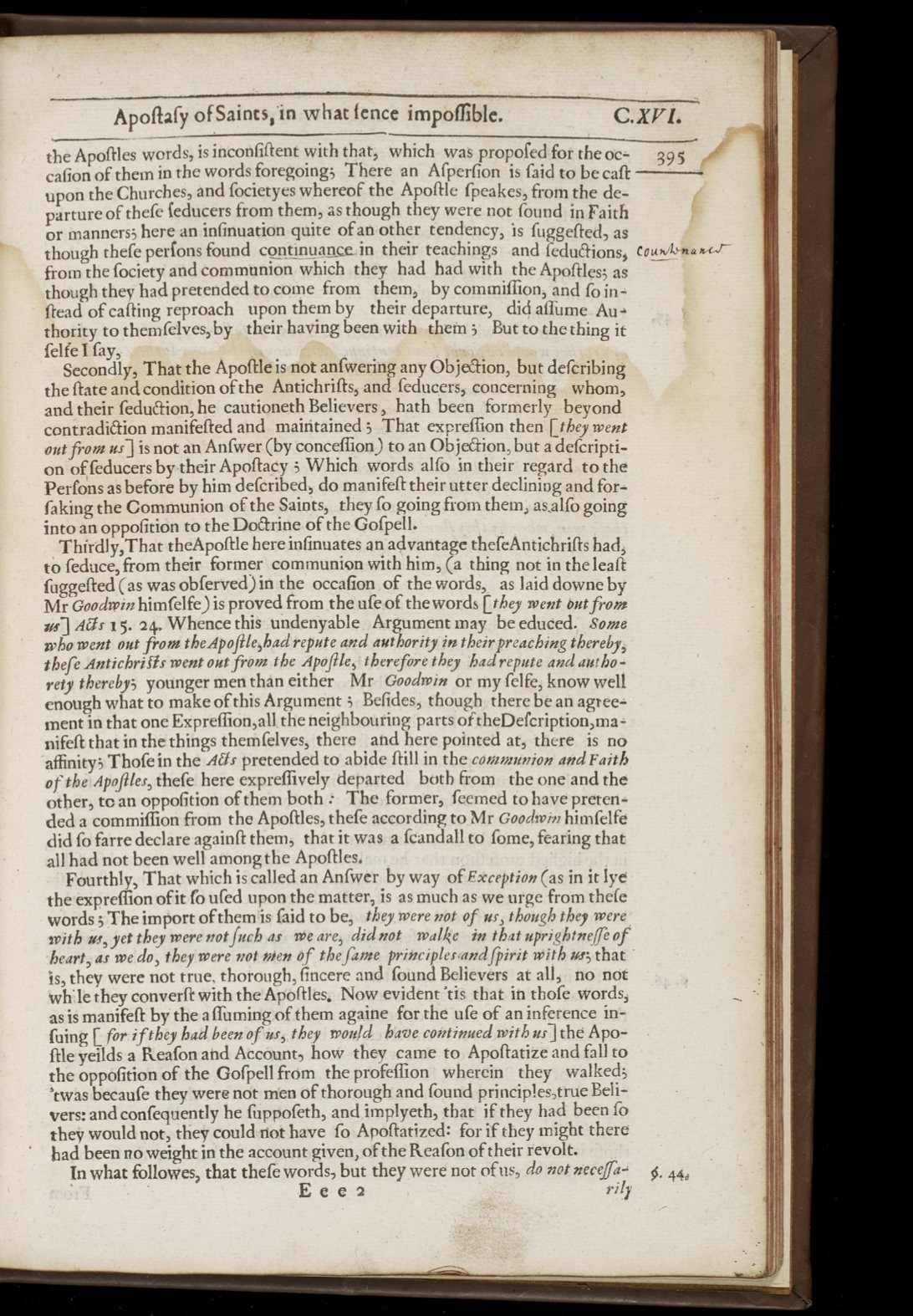

Apoftafy
of
Saints,
'in
what
fence
impofl
ble.
C.XV/.
the
Apofiles
words,
is
inconfiftent
with that, which
was propofed for
the
oc-
cafion
of
them
in
the
words foregoing;
There
an Afperfion
is
faid
to
be caft
upon the
Churches, and focietyes
whereof
the
Apofrle fpeakes, from
the de-
parture
of
thefe reducers
from
them,
as
though they
were
not
found
in
Faith
or
manners;
here
an infinuation
quite
ofan other
tendency,
is
fuggefted,
as
though thefe perlons
found continuance in
their
teachings and fedu
&ions,
from
the fociety and communion
which
they had had
with
the
Apoftles;
as
though they
had pretended to
come from
them,
bycommiflìon, and
fo
in-
ftead
of
cafring
reproach upon them
by
their departure, did
aflùme
Au-
thority
to
themfelves, by their having
been
with them
; But
to the
thing
it
felfe I
fay,
Secondly,
That
the
Apofile
is
not
anfwering anyObjection,
but
defcribing
the
Rate
and
condition
of
the
Antichrifis, and feducers, concerning
whom,
and their
fedu
&ion,
he cautioneth
Believers ,
hath
been formerly
beyond
contradi
&ion
manifefted
and maintained
;
That
expreffion
then [they
went
out
from
us]
is
not
an Anfwer
(by
conceffion)
to
an
Objection,
but
a
defcripti-
on offeducers by their
Apoftacy
; Which
words aifo
in
their regard
to
the
Perlons
as
before by
him
defcribed, do
manifeft
their
utter
declining and
for-
faking
the
Communion
of
the
Saints,
they
fo
going from them;
as,alfo
going
into
an
oppofition
to
the
Do&trirse
of
the Gofpell.
Thirdly,That
theApoftle here infinuates an
advantage
thefeAntichrifts had
to
feduce, from
their former communion with him, (a thing not
in
theleafi
fuggefred
(as
was
obferved)
in
the
occafion
of
the
words,_ as
laid downe by
Mr
Goodwin
himfelfe)
is
proved from
the
ufe
of
the
words [they
went out
from
us]
Ails
15.
24.
Whence
this
undenyable Argument
may
be educed.
Some
who
went out
from
theApoJtle,hadrepute
and
authority
in their
preaching
thereby,
thefe
Antichrilis
went out
from
the
Apoflle,
therefore
they
had
repute
and
atstbo-
rety thereby;
younger
men
than either Mr
Goodwin
or
my
felfe,
know well
enough what
to
make
of
this
Argument;
Betides,
though there
bean
agree-
ment
in
that
one Expreffiòn,all
the
neighbouring
parts oftheDefcription,ma-
nifeft
that
in
the
things themfelves; there and here pointed at, there
is
no
affinity;
Thofein the
Aids
pretended
to
abide
frill in
the
communion
and Faith
of
the
Apoflles,
thefe here expreffively
departed both
from
the one and the
other, to
an oppofition
of
them
both
:
The
former, teemed to have preten-
ded
a
commiffion from
the
Apofrles,
thefe according
to
Mr
Goodwin
himfelfe
did
fo
farredeclare
againfr
them,
that
it
was a fcandall
to
fome, fearing
that
all
had
not
been well among
the
Apoftles.
Fourthly,
That
which
is
called an Anfwer by way
of
Exception
(as
in
it lye
the
expreffion
of
it
fo
ufed upon the
matter,
is as
much
as
we
urge
from thefe
words; The
import
of
them
is
faid
to
be,
they were
not
of
us, though
they were
with as, yet
they were
not
Inch
as
we
are,
did
not
walla
in
that
uprightneffe
of
heart,
as
we
do,
they were not nien
of
the
fame
principles;and
fpirit
with
we;
that
is,
they were not true, thorough,
iincere and found
Believers
at
all, no
not
whie
they converft with the
Apofrles.
Now evident
'tis
that
in
thofe words,
as
is
manifeft
by the
a
(fuming
of
them againe for the
ufe
of
an inference
in-
ruing
[
for i
f
they
had
been
of
us,
they would
have continued with
us] the Apo-
file yeilds
a
Reafon and Account, how they came
to
Apoftatize and
fall
to
the
oppofition
of
the
Gofpell
from the
profeffion wherein
they walked;
'twas becaufe they were
not
men
of
thorough
and found principles,true
Beli-
vers: and confequently he fuppofeth,
and
implyeth,
that if
they had
been fo
they
would
not, they
could
not
have
fo
Apoftatized: for
if
they might
there
had been no weight
in
the
account given,
of
the
Reafon
of
their revolt.
Inwhat
followes,
that
thefewords,
but
they werenot ofus,
do
not
neceffa"
E
e e
2
rely
395
CO
u+0.-na
wr-.r".
4. 44a










